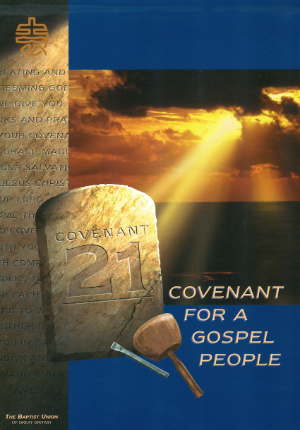Baptists and life in covenant
Responding to God resulted in relationships of mutual trust for the persecuted early Baptists – and has shaped how we’ve walked ever since, writes Professor Paul Fiddes

The beginnings
More than four hundred years ago a company of Christian believers met in a village in Lincolnshire and made a covenant together. They were facing persecution, imprisonment and even the prospect of death because they wanted to worship God freely in the way they believed God was calling them to do. One of their number, looking back on the event some years later, recalled that the members ‘joined themselves by a covenant of the Lord into a church ... to walk in all his ways, made known, or to be made known to them ... whatsoever it should cost them, the Lord assisting them.’
This congregation left England shortly afterwards to seek freedom abroad in Amsterdam where, through reading the Scriptures, they made a startling discovery. At the heart of this covenant promise was the baptism of believing disciples, of those who were able to respond to God’s grace with their own faith. Baptism expressed the covenant, and through baptism the covenant became actual in time and space. Thus this company became the first Baptist church, and some of their members returned just three years later to face oppression and hardship as they established the first Baptist church on English soil.
 As time went on, another phrase was usually added to the covenant promise among churches of the Baptist movement. Members were to ‘watch over each other’, holding each other up to discipleship and holiness, in a life that might contain many unexpected developments as they ‘walked together’ into a future in which God made their way ‘known to them’.
As time went on, another phrase was usually added to the covenant promise among churches of the Baptist movement. Members were to ‘watch over each other’, holding each other up to discipleship and holiness, in a life that might contain many unexpected developments as they ‘walked together’ into a future in which God made their way ‘known to them’.
These three notes of walking in fellowship, watching in mutual care and openness to ever-new possibilities have rung down the years in Baptist churches, and are enshrined in the ‘Covenant21’ service of covenant renewal that many Baptist Union churches and associations use today.
‘A response to Jesus Christ’
Not all Baptist churches have written actual covenants to be read and signed by the members, but Baptists have generally understood their life together to be covenantal in nature, and their understanding of baptism has always been covenantal. I mean that covenant has two dimensions, that we might call ‘vertical’ and ‘horizontal’. In the first place it is ‘vertical’: God makes agreement with us, giving disciples gathered together all the benefits of the salvation which has come through the death and resurrection of Christ and calling for our response to these gifts.
At the same time, it is an agreement that is ‘horizontal’, in which disciples promise to be faithful to each other. Covenant is therefore not merely a human choice to join together and do certain things together. It is not the kind of ‘strategic alliance’ that can be made in business and politics. It is – as those early seventeenth-century believers affirmed – ‘a covenant of the Lord’. It is a response to Jesus Christ who, as the maker of the New Covenant, is gathering us together and who stands in the midst of his people as the risen Lord in the power of the Holy Spirit. This covenant is sealed in the water of baptism and continually renewed in the bread and wine of the Lord’s Supper.
From the beginning of their church life, Baptists thought that ‘walking together and watching over each other’ was not just a matter for individual believers in a local congregation. Just as members of one church walked together in covenant, so congregations also walked together in ‘association’ with each other. Just as members in one church watched over each other, seeking to find the mind of Christ for their life and mission, so churches together were to watch over each other and seek the mind of Christ as they assembled together through their representatives.
No legal contract, only the way of trust
It is essential to realise that this covenant is not a legal contract. The ‘way’ in which covenant partners walk can only be one of mutual trust. This is where Baptists have given an insight to the universal church which is a true gift. In the local congregation, covenanted together, all the members ‘watch over’ each other, and this ‘oversight’ happens in the church meeting as they seek to find the mind and purpose of Christ for them. At the same time, Baptists have always believed that Christ calls some of these members to exercise ‘oversight’ (or a ‘watching over’) in a spiritual leadership of the congregation. Among Baptists there is no legal provision, no church law, which regulates the relation between these two forms of ‘oversight’, the one corporate and other personal. Congregations must therefore learn to live in the bonds of trust between the people and their ministers. Oversight flows to and fro freely between the whole congregation and its spiritual leaders.
In the same way, oversight flows to and fro between the local congregation and the association of churches. The single congregation lives in a covenant made by Christ, and Christ is present among them to make his purpose known. The congregation is his body, where Christ becomes visible in the world today. This is why the congregation has ‘freedom’ to make decisions about its life and mission, and cannot be coerced or imposed upon by any church authorities outside it. The congregation is not ‘autonomous’, which means ‘making laws for itself’. Christ makes its laws, and the church has the freedom and responsibility to discern his ways. It is free because it is ruled only by Christ.
But Christ also calls local congregations together into covenant, in association. Where churches are assembled through their representatives, there too Christ is present, there he becomes visible to the world in the body of his people, there his mind can be known through the help of the Holy Spirit. Local congregations are thus ‘interdependent’, needing each other’s spiritual gifts and understanding if they are to share in God’s mission in the world.
Yet in the covenant principle there is no legal contract, only the way of trust. In their search for the mind of Christ the local church meeting must listen to what the churches say as they seek to listen to Christ together. It must take with complete seriousness the decisions made at an association level, and will need good reason not to adopt them for itself. But in the end it has freedom to order its own life as a covenant community which stands under the rule of Christ. It needs the insights of other churches to find the mind of Christ, but then it has the freedom to test whether what is claimed to have been found is truly his mind. It might feel called to make a prophetic stand on some issue, and will stand under the judgment only of Christ as it does so.
Other churches may think that this covenantal approach of mutual trust is hopelessly impracticable, and that it would be better to regulate the relation between people and clergy, between churches and diocese or province. Baptists have learned over the years to live with the risks of trust and love. Here there is plenty of opportunity for muddles, mistakes and frustrations, but also room for all to flourish.
A national Union of churches
Quite late on in their history, it seemed to Baptists in the UK that they were being called to make a larger covenant. Just as churches were held in the covenant bonds of an association, so churches and associations could be held together in the covenant of a national ‘Union’ of churches. The driving force behind this conviction was the need for an effective mission in the whole country. Christ could be embodied, and could become visible to others through one Union at national level as well as through separate associations of churches. So compelling was this vision that Baptists of different persuasions, especially those who had previously been known as ‘Particular Baptists’ and ‘General Baptists’ came together in mutual trust.
Baptists expressed their commitment to each other and their sense of being called together by Christ in the ‘Declaration of Principle’ (first made in 1904). This is not a full confession of faith, but a covenant document in which Baptists commit themselves to love and work together in obedience to Christ as the supreme authority. They still seek his mind together through the two instruments of union which are the Council and Assembly of the Baptist Union of Great Britain. The one expresses a covenant between associations, and the other a covenant between all the separate churches and colleges in the Union. It is the same covenant, though the varying forms it takes in Council and Assembly requires trust for union to work.
In all the changing circumstances of life, covenant remains the way of trust, on a path which is yet ‘to be made known’ by the Lord of the covenant.
Picture: Mee Lin Woon/Freeimages.com
Paul S. Fiddes is a Baptist minister and Professor of Systematic Theology in the University of Oxford. He was formerly Principal of Regent’s Park College, Oxford, and has been Chair of the Doctrine and Church Unity Commission of the Baptist World Alliance.
Baptists Together, 07/01/2016